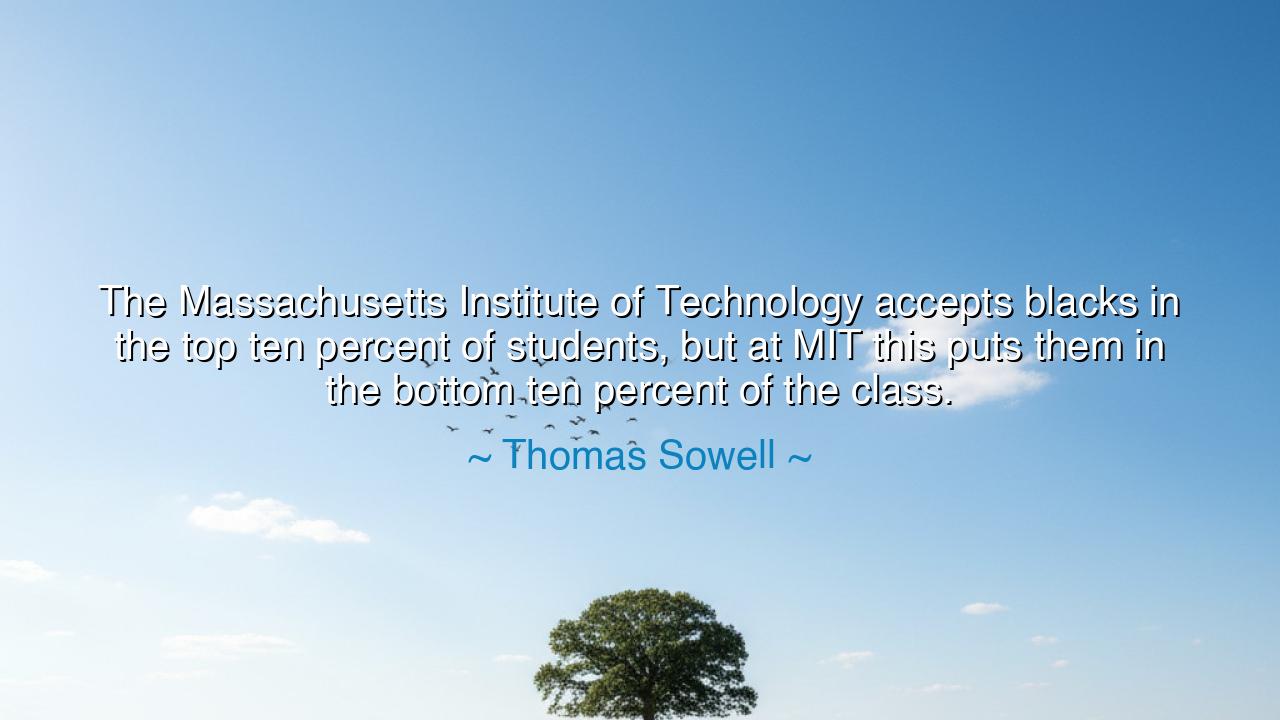
The Massachusetts Institute of Technology accepts blacks in the
The Massachusetts Institute of Technology accepts blacks in the top ten percent of students, but at MIT this puts them in the bottom ten percent of the class.






Hear the words of Thomas Sowell, sharp and unflinching, who declared: “The Massachusetts Institute of Technology accepts blacks in the top ten percent of students, but at MIT this puts them in the bottom ten percent of the class.” These words, though harsh to the ear, are not spoken in malice, but as a stern reminder of the gap between noble intentions and unintended consequences. Sowell, a man devoted to truth even when it unsettles, here points to the reality that in striving to help, one may sometimes wound; in seeking equality, one may sometimes create new forms of struggle.
At the heart of this saying lies the tension between opportunity and preparedness. To be in the top ten percent of students across the land is to shine brightly. But when placed among the brightest from every corner of the earth, that same flame may seem faint. The difficulty is not in the worth of the student, nor in the dignity of their person, but in the cruel mathematics of comparison. Sowell’s words call us to consider not only who is admitted into halls of greatness, but whether those admitted are given the foundation to flourish once inside.
The ancients themselves knew this lesson. In Sparta, every child was taken from his home to be trained in the agoge, the brutal schooling of warriors. Not all could endure. To cast the unprepared into the fire was not kindness, but cruelty. Likewise, in the Academy of Plato, the mind was trained step by step, from simple forms to complex truths. Plato knew that to thrust a student too quickly into higher study was to risk confusion and despair. So too Sowell warns us: to place any student—regardless of race—into an environment without preparation equal to its demands is to burden them with struggle where support was intended.
Consider the story of George Washington Carver. Born into poverty, denied opportunities, he nonetheless climbed steadily, step by step, mastering each rung of learning before ascending the next. By patience and preparation, he became one of the greatest scientists and educators of his age. His success did not come from being thrown into the deepest waters at once, but from a foundation carefully laid, upon which his genius could flourish. His life testifies that true uplift must be built on strength, not merely on placement.
Sowell’s words, then, are not meant to condemn, but to provoke thought. He compels us to ask: Is it enough to open the gates of great institutions, or must we also ensure that those who enter are armed with every tool they need to thrive? For if not, the result may be disillusionment, frustration, or failure—not from lack of brilliance, but from lack of preparation and proper support. In such cases, the noble intention may leave scars upon the very people it sought to uplift.
The lesson is clear: opportunity must walk hand in hand with preparation. It is not kindness to place a man upon a battlefield without training; nor is it justice to place a student in a hall of genius without first giving them the armor of readiness. True equality is not measured by entry alone, but by the power to succeed, to endure, and to excel once the gates are passed.
Practical wisdom lies before you: Build strong foundations. Whether in study, in craft, or in life, do not hurry to be placed where you are not yet ready. Strengthen yourself first, so that when you stand among the strongest, you do not falter but flourish. And for those who open doors—teachers, leaders, institutions—do not merely admit, but also prepare, support, and guide. In this way, opportunity will bear the fruit of achievement, not the burden of unintended harm.
So let this teaching be carried forward: the worth of a person is never in doubt, but the path of their growth must be carefully guided. Patience, preparation, and support must join opportunity, or else the promise of equality will ring hollow. Sowell’s words, though severe, remind us of a truth the ancients long knew: that greatness is not born in sudden placement, but in steady cultivation. And those who would build a just society must ensure not only that doors are opened, but that all who enter are made strong enough to stand.






AAdministratorAdministrator
Welcome, honored guests. Please leave a comment, we will respond soon